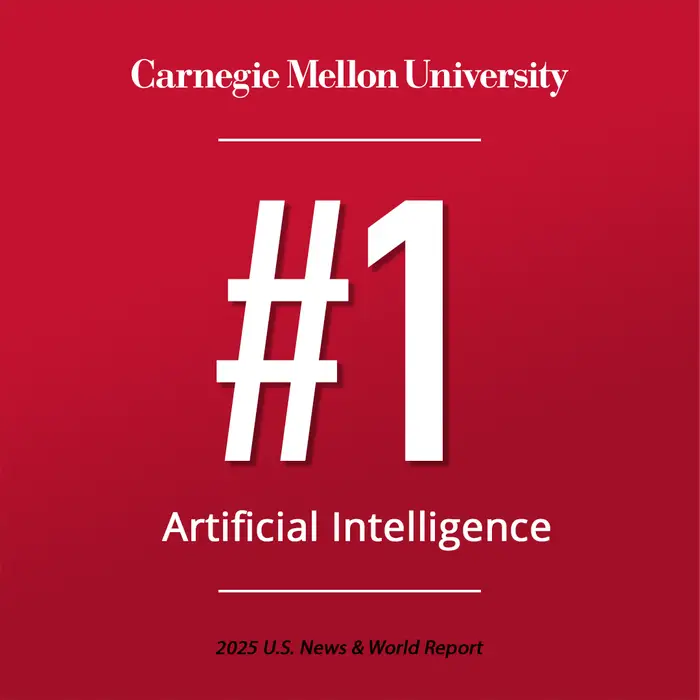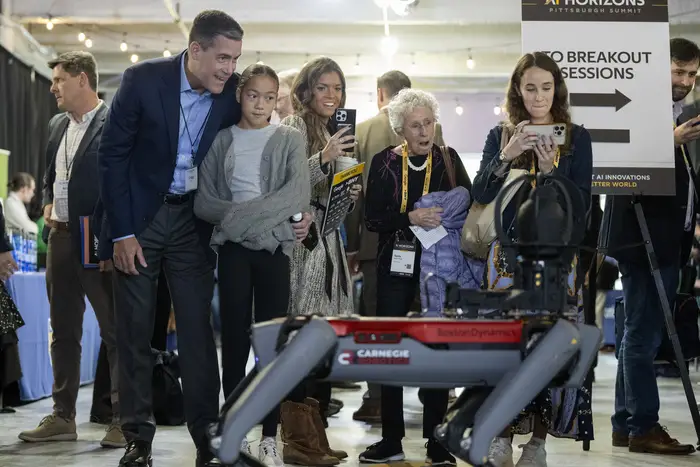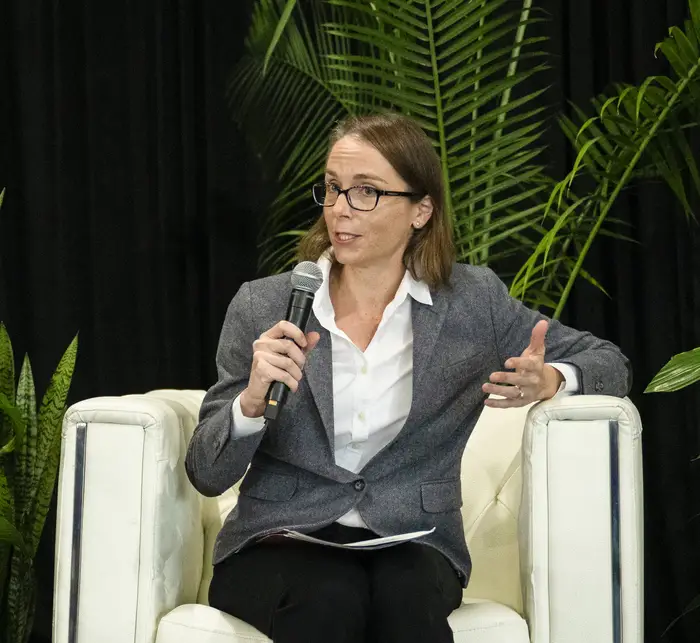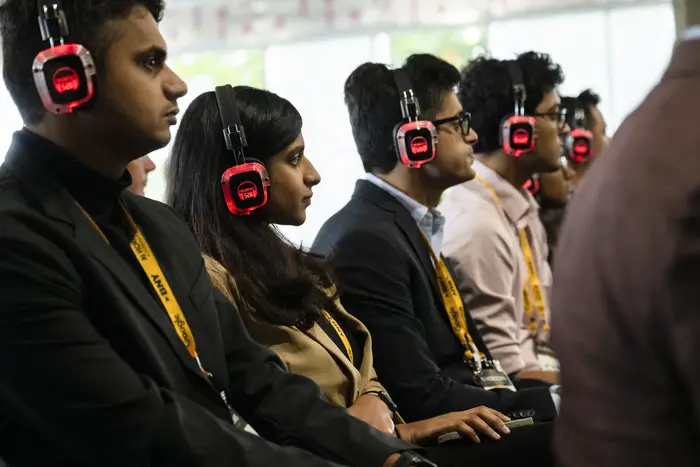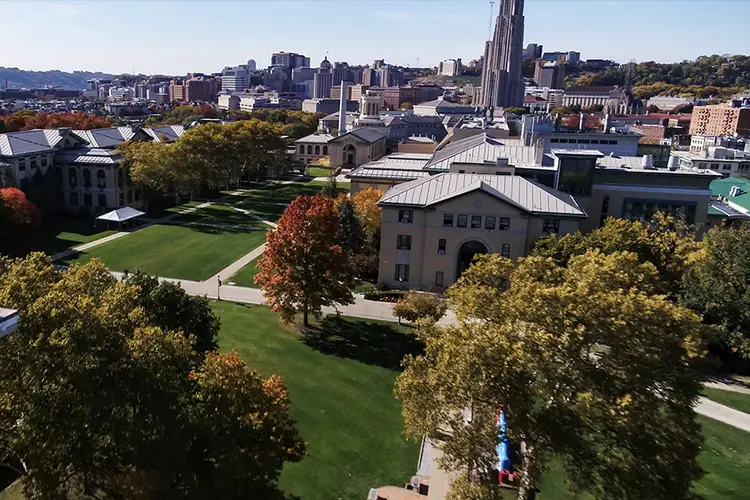
AI Horizons and Beyond: CMU Welcomes Revolution in Human-First AI to Pittsburgh
Media Inquiries
Pittsburgh steel helped build America, reinforcing structures(opens in new window) like the Empire State Building and the Golden Gate Bridge. This week, the Steel City hosted innovators, national tech leaders and policymakers as the region stands poised to be a hub for transformative artificial intelligence advancements.
The AI Horizons Pittsburgh Summit(opens in new window), held at Bakery Square, the site of a former Nabisco factory, showcased the ways human-first AI can benefit society. Dubbed AI Avenue(opens in new window), the one-mile corridor is anchored by Google, Duolingo, UPMC Enterprises and Carnegie Mellon University’s automated science and engineering(opens in new window) initiative.
Pennsylvania Gov. Josh Shapiro joined Carnegie Mellon President Farnam Jahanian(opens in new window) and Google Global Head of Knowledge and Information Products Cris Turner at the summit to discuss how the region can leverage its strength in AI to create jobs.
Following that fireside chat, Jahanian, Joan Gabel, University of Pittsburgh chancellor; Anthony Robbins, federal vice president at NVIDIA; and Shapiro announced a first-of-its-kind NVIDIA AI tech community in Pittsburgh to advance the city’s robotics, autonomy and artificial intelligence innovation ecosystem.
CMU and partners across Pennsylvania advance AI adoption
Seated in front of a wall decorated by circular black and gold summit logos, Shapiro explained how Pittsburgh can lead the AI renaissance.
“Pittsburgh is used to being the center of the universe when it comes to powering the economy in this country,” Shapiro said. “Whether it was the steel we forged or the energy we produced, Pittsburgh has been on the map for generations. This is now our next chapter, and to me, it seems like the AI and robotics technology that we are building here in Pittsburgh is the next big thing, and we are poised to seriously take advantage of it.”
The governor went on to show how his administration didn’t just talk the talk when it came to AI adoption. In September 2023, Shapiro visited Carnegie Mellon to sign an executive order outlining responsible standards and a governance framework for generative AI used by commonwealth agencies.
Ten months into a yearlong pilot study exploring use cases for generative AI involving 150 Pennsylvania state employees, Shapiro said participants on average saved 105 minutes per day by using AI tools.
“That doesn’t mean they’re working 105 minutes less,” Shapiro said. “What it means is now they have 105 more minutes in their day to deal with the really complex challenges.”
Jahanian expanded on how AI tools could benefit everyday life.
“For somebody like me, who's a computer scientist, I could not have imagined this year. We were able to do instant language translation. We're able to do text transcription. We're able, as you said, to navigate traffic and roads. We can now do highly accurate medical diagnoses, much more advanced than we've ever seen,” Jahanian said. “All of that are the new markets, economies, jobs that we're going to create that are going to benefit not only humanity, but also really improve the quality of life.”
AI research on display at Bakery Square
Throughout the summit, regional innovators demonstrated the AI and robotics work shaping the future.
(opens in new window)Yonatan Bisk(opens in new window), an assistant professor in CMU’s Language Technologies Institute(opens in new window) with a courtesy appointment in its Robotics Institute(opens in new window), demonstrated projects from the Real, Embodied AI and Learning(opens in new window) (REAL) faculty at the university who work on the intersection of topics including machine learning, computer vision, robot perception and control, and object manipulation.
Bisk praised the event for highlighting Pittsburgh’s strengths in the field.
“Our biggest thing as professors is not to have a brain drain to Silicon Valley,” Bisk said. “We really want a community that’s built here that’s useful for our students and generates opportunities for them.”
Matthew Johnson-Roberson(opens in new window), director of CMU’s Robotics Institute, echoed that sentiment while touring the demonstrations at the summit.
“Anything we can do to keep people here and create long-term opportunities that enrich Pittsburgh is key — and that’s Carnegie Mellon,” Johnson-Roberson said. Looking around the crowded event, he continued, “People are obviously here, and that is telling! Is Pittsburgh going to lead the AI renaissance?”
Ira Moskowitz(opens in new window), the chief executive officer of the Advanced Robotics for Manufacturing (ARM) Institute, spoke on a panel about the infrastructure needed to support AI advancements. He said his goal is getting humans and AI to work together on production lines.
"As a country, the number one core topic is AI. So virtually everything we do now is AI," he said.
Funded by the Office of the Secretary of Defense, the ARM Institute was created in 2017 at CMU and now operates as a separate nonprofit. The institute is headquartered at Mill 19(opens in new window) in Hazelwood — the location of the region’s most productive steel mills which now serves as home to some of the nation’s most advanced manufacturing research alongside CMU’s Manufacturing Futures Institute(opens in new window) (MFI).
From Hazelwood, the ARM Institute, MFI and Catalyst Connection(opens in new window) build out programming to help prepare the workforce to work with AI in manufacturing. Working with its members, the ARM Institute created a competency framework for robotics careers in manufacturing(opens in new window) and is currently working with its members to define the skills needed for AI in manufacturing, which will feed into these frameworks.
In March of this year, a federal award from the Department of Defense established the national AI Data Foundry for Robotics(opens in new window) (AIDF), a new project being led by the ARM Institute in partnership with Carnegie Mellon and Catalyst Connection to develop a national center that will collect and aggregate data for robots working in manufacturing settings. Carnegie Mellon will develop the machine learning algorithms and toolboxes manufacturers need to advance robotic technology within the AIDF. The ARM Institute has asked CMU faculty for projects centered on AI-based tools that can be integrated synergistically and transition to industry practice. It plans to issue a project call in this same area to its 400-plus member consortium this fall.
Sustainable AI: challenges and solutions
Another panel centered on how artificial intelligence can empower a sustainable future. It featured Valerie Karplus(opens in new window), the associate director of the Wilton E. Scott Institute for Energy Innovation(opens in new window) and a professor of engineering and public policy at CMU.
“AI comes with additional challenges and solutions,” Karplus said. “We can think about these intersections as existing in several different guises, one being the fact that many of the new artificial intelligence technologies are very energy hungry, and water hungry as well.”
The panel included David Bromberg, CMU alumnus and co-founder of power grid planning company Pearl Street Technologies; Anthony Mattarazzo, director of AI and solutions at Ansys; and Jessica Olcott Yllemo, a U.S. Navy research scientist.
Bromberg spoke about the importance of automation in his work with physics-based grid optimization, and the need for increased support as companies rely on short-term information and opportunities to develop long-term solutions.
“AI strategy is the new digital strategy,” Karplus said.
How does AI affect national security?
Carnegie Mellon Angel Jordan University Professor of Computer Science Tuomas Sandholm(opens in new window) joined Artificial Intelligence Integration Center(opens in new window) (AI2C) Director Isaac Faber and Lovelace AI CEO Andrew Moore, the former dean of CMU’s School of Computer Science, for a panel titled, “AI for National Security: What’s the Urgency?”
Sandholm founded CMU spinout Strategy Robot(opens in new window) in 2018, an AI-software company focused on generating theoretically-sound strategies against advanced adversaries.
The three experts discussed how AI is transforming national security and the urgent need for increased support in both the private sector and military as the technology sees continued growth and application, accelerating decision making processes in high-stakes environments.
“As Western democracies, we need to stay ahead, and it’s not just something that can be done once and then we’re done forever,” Sandholm said.
Three 2022 CMU alumni represented AI2C, an Army Futures Command laboratory in Pittsburgh that allows the Army to better connect with the AI and robotics community. Capts. Bryce Wilkins, Andre Michell and Taylor Michell attended Carnegie Mellon through AI2C’s Artificial Intelligence Scholars program, which includes 20-22 months pursuing a master’s degree followed by a 24-month utilization tour at AI2C.
“Across the board, CMU taught us both the critical-thinking problem-solving skills, but also the deep technical knowledge that we need,” Andre Michell said. “Our CMU degrees all fuel directly into what we do day-to-day and what the United States Army needs to deliver: AI solutions at speed.”
Michael Mattarock II(opens in new window), CMU’s executive director for national security research and invited summit speaker on a panel titled, “AI and National Security: Pittsburgh’s Strategic Role,” said the university is excelling in creating training programs across the workforce.
“A lot of our training really focuses on building that AI fluency that we need to have across the board, regardless of your role within an organization,” he said.
Deepfakes highlight AI safety and legislative issues
Much of the summit’s conversation revolved around the trust and safety of AI, and how to regulate it. In his fireside chat, Gov. Shapiro said that he would sign into law this Wednesday a bill that outlaws the distribution of pornographic deepfakes in Pennsylvania. Most states have enacted some type law as it becomes easier to create these types of images and videos.
“We have got to also make sure that we are keeping up with how the technology changes,” Shapiro said. ”Lawmakers came together and were able to pass a bill that creates criminal penalties for AI-generated imagery that will be considered fake porn.”
In the day’s closing panel discussion, Zico Kolter(opens in new window), the director of the Machine Learning Department(opens in new window) at CMU and a board member of OpenAI, discussed his view on the most effective way to legislate new AI technologies.
“I still often do find myself on the side of sort of legislation around specific use cases. Around domains in health, we need legislations that are pertinent to health. Around defense, we need things for defense. And around digital abuse, we need laws that target that end use of this technology,” Kolter said.
- Student Engagement
- Faculty Engagement
- Sponsored Research
- Professional Education
- Licensing and Tech Transfer
- Startups
- Colocation



